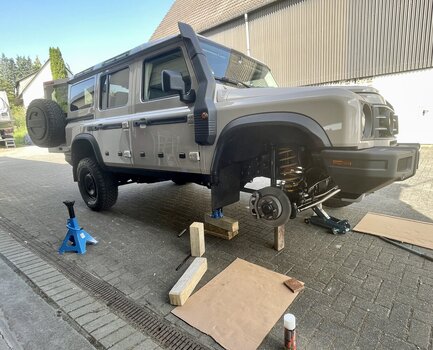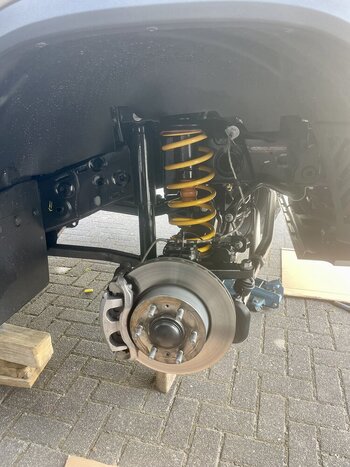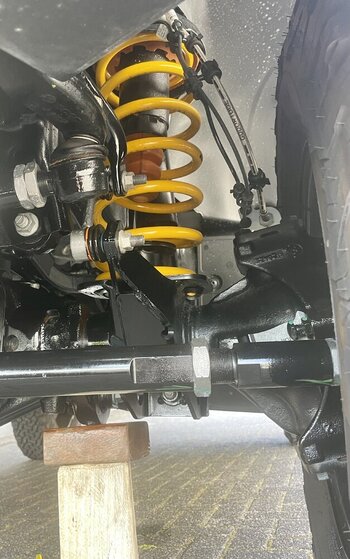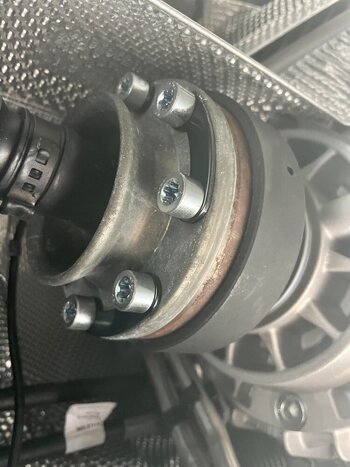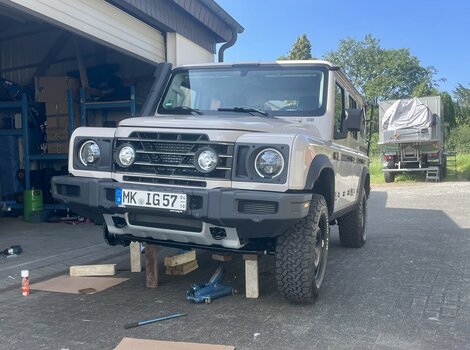Famous picCustomer collected car and was passed by his two rear wheels as he braked!
The Grenadier Forum
You are using an out of date browser. It may not display this or other websites correctly.
You should upgrade or use an alternative browser.
You should upgrade or use an alternative browser.
Rust (rust on wheel centres/axle ends)
- Thread starter Wilaspira
- Start date
Exactly. With lubricants, friction becomes less. So instead of being destroyed as friction, the energy is simply converted into more tension, so that the screw is overloaded and breaks off.putting any lubricant on the studs or wheel nuts will change the torque settings, allowing you
to potentially over torque without knowing it and if not careful break a threaded stud off
typo
Last edited:
Every screw or bolt is oversized in a machine. The question is how much reserve there is. Sometimes the oversizing is quite high, and you are still within the limit. But sometimes it is not.Most say
don't apply any lubricant, however there are some that say they have been doing so and never experienced any issues.
With wheels, the bolts are way oversized and can usually handle lubricants - although this is not the intent of the massive oversizing. Wheels live in a dirty environment that requires stronger oversized bolts due to less than optimal mounting conditions. In the worst case - which does not happen often - they finally break with lubrication.
And very unvented…..those brakes and disks look pretty small....
I feel a big brake kit in the near future.
- Local time
- 3:38 AM
- Joined
- May 19, 2022
- Messages
- 2,123
- Reaction score
- 3,995
That's exactly what I've been doing for many years. But be careful, I only use copper paste on steel rims, not on alloys.Theoretically, yes. You should not grease studs as it can lead to over torquing. Bentley motors have a paper on this which you can find online. Personally, based on my 50 years of putting a small amount of copper slip on each stud I have NEVER had any issues and it only made life easier.
- Local time
- 3:38 AM
- Joined
- May 19, 2022
- Messages
- 2,123
- Reaction score
- 3,995
Quite right! That's why I don't let tyre dealers on my vehicle. Because they, like many other vehicle workshops, cannot operate a torque spanner.The biggest risk is with people who rely on tyre shops using rattle guns to tighten their wheel nuts.
Check wheel nuts yourself , regularly, if you don't already have this habit.
And beware of actvists and delinquents who are prone to loosening them without your permission.
- Local time
- 8:38 AM
- Joined
- Jul 27, 2022
- Messages
- 6,005
- Reaction score
- 13,342
Yes, on this occasion I've only put Copaslip on parts of the hub face and wheel centre that I can see directly mate with surface contact. Unfortunately, I didn't take photos, as when the Copaslip comes out, anything relatively expensive gets put away.Threads? I prosume DCPU meant the surfaces only?
I've always put it on wheel stud threads on Landrovers but this time I'm going to leave untouched and see what happens.
- Local time
- 7:38 PM
- Joined
- May 15, 2022
- Messages
- 1,515
- Reaction score
- 3,943
- Location
- Sydney NSW, Australia
I’ve not used it in this way. You just apply to leave a thin film?Yes, on this occasion I've only put Copaslip on parts of the hub face and wheel centre that I can see directly mate with surface contact. Unfortunately, I didn't take photos, as when the Copaslip comes out, anything relatively expensive gets put away.
I've always put it on wheel stud threads on Landrovers but this time I'm going to leave untouched and see what happens.
Common for brake pad wear sensors to be only on one wheel front and rear, normally on opposite sides of the vehicle.Might also be worth noting that the brake pad wear sensor only seems to be present for the rear on one side - for RHD this is the offside:
View attachment 7814924
- Local time
- 8:38 AM
- Joined
- Jul 27, 2022
- Messages
- 6,005
- Reaction score
- 13,342
Yes, just a smearing. Too much and it will just spin off under centrifugal force and coat everything you didn't want it to.I’ve not used it in this way. You just apply to leave a thin film?
- Local time
- 8:38 AM
- Joined
- Jul 27, 2022
- Messages
- 6,005
- Reaction score
- 13,342
Spot on.Common for brake pad wear sensors to be only on one wheel front and rear, normally on opposite sides of the vehicle.
For a RHD, rear offside (above), and nearside front:
If you use something like Molycote 1000 it even helps to get the right torque. This Molycote helps to get an equal and definded friction and thereby torque between different joints.A question, for wheel lugs does greasing the threads do anything negative to reaching a correct tightening torque, i.e. will that lead to overtightening?
If in doubt, please consult the book "
An Introduction to the Design and Behavior of Bolted Joints, Revised and Expanded (Mechanical Engineering, Band 97) "
from John H. Bickford. He wrote the standard maintenance book for bolted joints in nuclear plants and one thing he stresses in that book is, how putting the right stuff on threads helps getting the right torque to prevent joints to fail.AWo
Ahh, an addition for German language people. This is a video from a company called "Ludwig Meister", a supplier for industrial customers. They do a lot videos regarding many mechanical stuff and how to do it right (small fun fact, Mr. Meister (not the guy in the video but the company owner) is the husband of Cathrin Meister, the lady and 4x4 instructor you can see on these Grenadier videos in this forum. Both do crazy trophy stuff...I know her for quite a time and my wife did an offroad training with her. Last week I meet her for the first time personally after doing some podcasts with her at the Abenteuer&Allread fair, quite an impressive lady).
It shows how to smeer bolts for getting the torque right and equal. As Mr. Bickford wrote in his book, it is more important to have equal torque between the bolts than the right torque (which is also important, but just to compare the importance). Me personaly use Molycote 1000 on my vehicles since 4 to 5 years for the wheel studs.
View: https://www.youtube.com/watch?v=VI6Dfmr2-QY
AWo
It shows how to smeer bolts for getting the torque right and equal. As Mr. Bickford wrote in his book, it is more important to have equal torque between the bolts than the right torque (which is also important, but just to compare the importance). Me personaly use Molycote 1000 on my vehicles since 4 to 5 years for the wheel studs.
AWo
Last edited:
Gave some love to my Genadier earlier today since it had some minor rust on bolts and wheel centre‘s when I did a testride some 2 weeks ago.
When I picked it up last week my dealer had removed at least the visible portion of it.
From the morning exercise I highly recommend spending some time early on (before the underbody completely covered w/ mud ;-) and do some conservation.
I used Owatrol Oil since it works perfectly on my 1989 firetruck/RV.
When I picked it up last week my dealer had removed at least the visible portion of it.
From the morning exercise I highly recommend spending some time early on (before the underbody completely covered w/ mud ;-) and do some conservation.
I used Owatrol Oil since it works perfectly on my 1989 firetruck/RV.
Attachments
- Local time
- 8:38 AM
- Joined
- Jul 27, 2022
- Messages
- 6,005
- Reaction score
- 13,342
One thing I've seen, but not in detail, is that there was a TSB (Technical Service Bulletin) issued for this. Verbally, I was told agents were to paint/spray them.When I picked it up last week my dealer had removed at least the visible portion of it.
An owner should not have to do this type of 'maintenance' on a brand new modern 'outdoor' vehicle. How does a warranty go if you add a lubricant, and later have an issue? I will be asking my Agent how self-maintenance goes and what limitations IA is putting on owners...One thing I've seen, but not in detail, is that there was a TSB (Technical Service Bulletin) issued for this. Verbally, I was told agents were to paint/spray them.
- Local time
- 8:38 AM
- Joined
- Jul 27, 2022
- Messages
- 6,005
- Reaction score
- 13,342
There should be no owner maintenence necessary if agents undertake the remedial work as stated in the TSB...An owner should not have to do this type of 'maintenance' on a brand new modern 'outdoor' vehicle. How does a warranty go if you add a lubricant, and later have an issue? I will be asking my Agent how self-maintenance goes and what limitations IA is putting on owners...
Similar threads
- Replies
- 7
- Views
- 909
- Replies
- 26
- Views
- 2K
- Replies
- 6
- Views
- 1K

